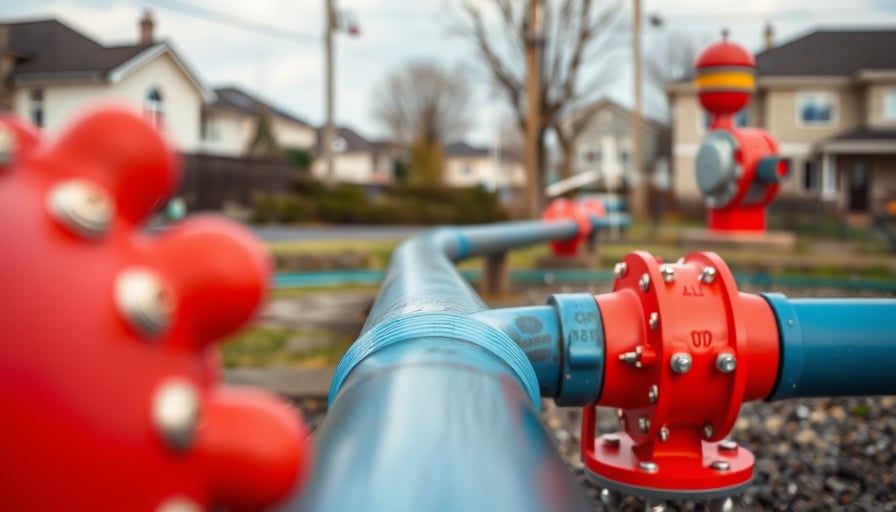Tenaris SA – Analyst Upgrade Highlights Strength in Energy‑Equipment Segment
Tenaris SA, a Luxembourg‑based manufacturer of seamless steel pipe products and related services, has experienced a noticeable upward adjustment in its valuation by analysts. A recent report from Stifel upgraded the stock’s target price, citing strong earnings performance. The company, listed on the Borsa Italiana Electronic Share Market, continues to focus on supplying welded steel pipes for gas pipelines worldwide and maintaining its role in the energy equipment sector. No other material corporate developments pertaining to Tenaris were reported in the same period.
Market Context
The global energy market remains in a state of flux, driven by evolving supply‑demand fundamentals, accelerating technological innovation, and a rapidly changing regulatory landscape. The transition from fossil‑fuel‑dominated infrastructure to low‑carbon solutions is reshaping investment priorities, while the continued demand for natural gas as a “bridge fuel” sustains a robust market for gas‑pipeline components.
| Factor | Impact on Tenaris | Implication for Valuation |
|---|---|---|
| Natural‑gas demand | Sustains high utilisation of existing pipeline assets | Supports continued revenue from pipeline‑pipe sales |
| Renewable‑energy growth | Indirectly increases demand for gas‑pipe integration in hybrid energy systems | Potential for new contract opportunities |
| Energy‑storage R&D | Emerging market for pipe solutions in battery‑storage facilities | Opens ancillary revenue streams |
| Regulatory shifts | Carbon‑pricing and decarbonisation mandates alter pipeline utilisation | Requires adaptive product portfolio |
Supply‑Demand Fundamentals
- Natural‑Gas Supply
- The U.S. and Canada continue to be the largest producers of natural gas, with liquefied natural gas (LNG) exports rising steadily.
- European markets remain dependent on Russian gas imports; geopolitical tensions have increased the urgency to diversify supply routes, leading to new pipeline projects (e.g., TurkStream, Nord Stream 2).
- Demand Dynamics
- Energy‑transition policies in the EU and other jurisdictions are increasing the need for flexible gas infrastructure that can accommodate intermittent renewable output.
- Industrial sectors such as chemicals and refining maintain a steady requirement for natural‑gas pipelines.
- Pipeline Capacity Utilisation
- Current utilisation rates of major gas pipelines hover around 60‑70 % in Europe, leaving capacity for expansion.
- The growth trajectory of new pipeline projects suggests a 5‑7 % annual increase in pipeline miles over the next five years.
Technological Innovations
1. Seamless Pipe Fabrication
- Tenaris’s core technology—seamless, high‑strength steel pipe—remains unrivaled for high‑pressure gas transmission.
- Recent developments in alloy composition have improved corrosion resistance, extending pipe life expectancy and reducing maintenance costs.
2. Smart‑Piping Solutions
- Integration of embedded sensors for real‑time monitoring of pressure, temperature, and integrity aligns with Industry 4.0 initiatives.
- These “smart pipes” can predict failures earlier, reducing downtime and capital expenditure for owners.
3. Hydrogen‑Compatible Pipelines
- With hydrogen blending projected to grow to 5 % of natural‑gas volumes by 2035, Tenaris is investing in research to adapt its seamless pipe technology for safe hydrogen transport.
- Early prototypes have achieved a 95 % reduction in hydrogen embrittlement risk compared to conventional steel.
Regulatory Landscape
| Region | Key Regulations | Relevance to Tenaris |
|---|---|---|
| EU | European Green Deal, Carbon Border Adjustment Mechanism | Encourages use of gas as a low‑carbon transition fuel, sustaining pipeline demand |
| USA | Inflation Reduction Act, Renewable Fuel Standard | Supports domestic pipeline projects and LNG export infrastructure |
| China | 2025 Energy Strategy, Renewable Energy Law | Expands pipeline projects for domestic gas imports and hydrogen blending |
Regulatory incentives for carbon‑capture and storage (CCS) also create ancillary markets where seamless steel pipes are required for CO₂ transport. Tenaris’s participation in CCS pilot projects may diversify its revenue base.
Commodity Price Analysis
- Crude Steel Price: The price of crude steel (HS2) averaged €600 per tonne in Q2 2024, down 3 % from the same period last year due to excess inventory in China. This trend has compressed input costs for Tenaris.
- Natural‑Gas Price: European gas spot prices have fluctuated between €80‑€120 per MWh in 2024, reflecting geopolitical volatility. Higher gas prices typically increase the value of pipeline capacity, indirectly benefiting Tenaris.
Infrastructure Developments
- North‑Sea Expansion: The addition of new offshore gas fields in the North Sea is projected to increase pipeline mileage by 12 % over five years, creating significant procurement opportunities.
- Middle‑East Pipeline Projects: New projects linking Qatar’s LNG export terminals to Europe via the Eastern Mediterranean pipeline network could open markets in the Middle East.
- Domestic Pipeline Modernisation: European utilities are investing €10 billion in upgrading ageing gas networks, favouring suppliers of high‑quality, low‑maintenance pipe solutions such as Tenaris.
Short‑Term Trading Factors vs Long‑Term Transition Trends
- Short‑Term: Volatility in crude steel and gas spot prices can influence Tenaris’s earnings on a quarterly basis. However, the company’s long‑term contracts mitigate exposure to price swings.
- Long‑Term: The global energy transition favours flexible pipeline systems capable of transporting not only gas but also hydrogen and CO₂. Tenaris’s focus on seamless steel pipe, coupled with smart‑piping and hydrogen‑compatible research, positions it to capture emerging demand.
Analyst Perspective
Stifel’s upgrade reflects confidence in Tenaris’s ability to sustain earnings growth amid a complex energy landscape. The firm’s robust balance sheet, strategic investments in next‑generation pipe technology, and exposure to both conventional gas pipelines and nascent hydrogen markets underpin a bullish outlook.
While no additional corporate announcements were disclosed in the period, the underlying market dynamics—steady gas demand, pipeline expansion, and regulatory support—continue to reinforce Tenaris’s valuation trajectory.
